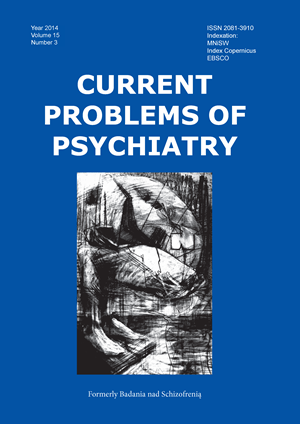Psychiatry in the Face of Ethical Challenges. A report from the “Focusing on Ethics”Session of the XVI World Congress of Psychiatry in Madrid
Keywords:
psychiatry, ethics, Declaration of MadridAbstract
Ethical issues play an important role in current psychiatric practice. These issues are the subject of many conferences and publications, and, predictably, they were brought up again during the XVI World Congress of Psychiatry, organized by the World Psychiatric Association (WPA), which had taken place in Madrid, 14-18 September 2014. In this congress, one of the presidential sessions was devoted to ethical issues. During this session, lectures were delivered by Prof. Ahmed Okasha from Egypt; Prof. Paul S. Appelbaum of the USA; Prof. Fernando Lolas of Chile; and Prof. Juan José López-Ibor of Spain. The main topics of these sessions were: the ethics of psychopharmacological treatment, the principles underlying psychiatric ethics (which are included in the Declaration of Madrid), the ethical issues confronting psychiatry in the XXI century and the creation and sustaining of psychiatric ethics committees. In all of these presentations, much attention was given to the Declaration of Madrid, issued in 1996. This document is fundamental to, and it is the starting point for further discussion about the ethical framework for current psychiatry. Indeed, many opine that there is need for a thorough revision of this document in order to answer the challenges of the present. The presentations served to lend impetus to the debate about how the world of psychiatry may apply ethical principles in practice. An important issue raised, addressed the need to create appropriate ethics committees that can support psychiatrists in approaching the most difficult decisions they must make in their daily practice, while allowing them to avoid many of the attendant risks (including those related to the stigma of patients and physicians) and to avoid the reductionist approach to the patient. There was also an expressed need to build good and creative relationships between psychiatrists.


